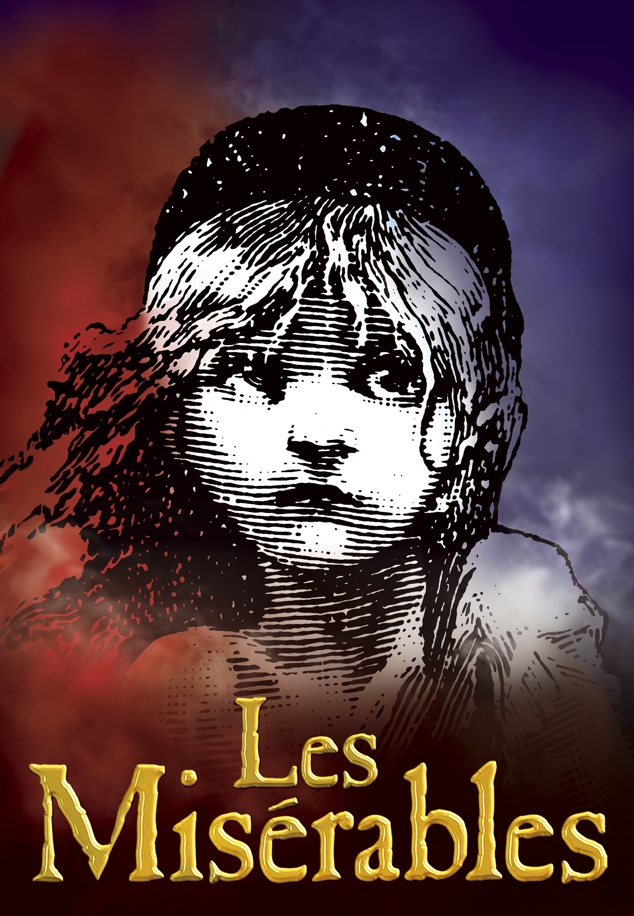I know why you’ve shunned Les Miserables. I know because it’s the same reason I shunned it.
It’s the title isn’t it? Les Miserables. Depressing.
Then there’s the poster.
I used to think, “I don’t care if millions of Les Mis devotees rave on and on about it being the ‘best musical ever,’ I will never believe them. Don’t they realize that all of the truly great musicals have happy titles like The Sound of Music and posters of smiling people twirling in a fields of flowers?”
I pause now to apologize to Les Mis fans everywhere. You were right. I was wrong. It IS the best musical ever. And how do I know this? Because (duh) I finally saw Les Miserables.
And just in case you think, “Wow, she really drank the Les Mis Kool-aid,” I’ve got someone to back me up. You see, I’m not the only glo girl who thinks Les Miserables is amazing. Emily Ryan, our very own Glo Girl Editor agrees with me!
So read on for a tag-team-style Q&A as Emily and I share why we love Les Miserables AND why we highly recommend that you see the movie and become one of its many fans, too.
Question: Why do you love Les Miserables? What major themes and messages make a story with such a depressing title so uplifting and inspiring?
Emily: My first experience with Les Mis was when I was in college and saw Katie Holmes sing a version of On My Own on an episode of Dawson’s Creek. I fell in love with the song so much that I bought the original Broadway soundtrack. I fell in love with the soundtrack so much that I went to see the musical when it came to Houston. I fell in love with the musical so much that I read a modern-day translation of the book. I fell in love with the book so much that I went to New York and saw the musical on Broadway. More love. Then I read the abridged version of the book. Still more love. Then I saw this movie. And the love was so strong that I am now committed to reading the entire 900+ page unabridged English translation of the original novel by Victor Hugo. I’m about 10% into it and, no surprise, I’m loving it!
I love Les Mis because it is a story about redemption, and it answers the age-old question: Can a bad man truly change for good? with the most precise answer ever. Yes, but only with God’s help.
We’ve all felt miserable at one point or another. But Les Mis reminds us that misery is only temporary. In God alone, we have something stronger and more powerful than misery; we have hope.
The story also explores noble themes such as adoption, sacrifice, prayer, hard work, young love, friendship, and eternal life. The themes are so timeless that this 19th-century novel still rings relevant today.
Laurie: It’s hard to turn down a night at the theater — especially when dear friends are so anxious to share their favorite musical with you. And when the dear friends also are generous (as in free tickets and excellent seats) and delightful to spend an evening with (as in fun-on-a-stick), I think you can see why Bill and I agreed to go see a musical we had previously shunned. Now? We pay for our own tickets, we purchase them for others, and we see Les Mis as often as possible. We’re practically Les Mis evangelists.
So, why do I love Les Mis? For all of the reasons Emily listed above and more. Les Miserables is an amazing story of redemption, hope, love, and grace. And although I am certain Victor Hugo’s original book is a masterpiece, his story soars when put to song.
Songs – stunning melodies and striking lyrics – stir the heart and move the soul from beginning to end in Les Miserables. So if you’ve only seen the 1998 version of the movie with Liam Neeson, you’ve missed (in my opinion) the most exquisite part of Les Mis: the songs.
An intensely spiritual story with an inspiring musical score, that’s why I love Les Miserables.
Question: Who is your favorite character in Les Miserables and why?
Emily: My favorite overall character is the Bishop of Digne. In the musical, he has such a brief part, but it’s such a critical part in the story. [Fun Fact: In the movie, the Bishop is played by Colm Wilkinson who originated the role of Jean Valjean in the stage musical!] Now that I’m reading the unabridged translation of the novel, I’m enjoying getting to know the Bishop even more.
I also have to add, though, that in this movie, I was most surprised by Eddie Redmayne, who played the role of Marius. He did a fabulous job mixing singing and acting, and his rendition of Empty Chairs at Empty Tables was magnificent.
Laurie: I love the Bishop, too. And I love that he appears very early in the movie and sets the tone for what’s ahead.
But Jean Valjean, the main character, wins my heart as my favorite character in his soliloquy, What Have I Done (sung right after his scene with the Bishop).
A private man, Valjean carries many secrets – even from his daughter, Cosette. She fears he keeps too much to himself, and she longs to know more about him.
But we know all of Valjean’s secrets because he shares them with us. Others may only know him as a convict, a businessman, and a father. But we are privy to his every thought, and he allows us to peer into his very heart.
Scene by scene, song by song, Valjean is an example of grace, humility, and courage – a man willing to lay down his life for another. Ultimately, he is an example of Christ. And as such, his character encourages, convicts, and challenges me in my own walk with the Lord.
Question: If you had to choose your favorite scene from Les Miserables, what would it be and why?
Laurie: It’s a weep-fest, but I love the scene when Valjean finds Fantine at the hospital dying and dreaming deliriously of her daughter. Their brief conversation is beautiful and heart-wrenching.
As a mother, I relate to Fantine’s love for her child. Her final thoughts on earth are not for herself but for her child. And her dying wish is that her child will know how much she loves her.
Bring the Kleenex. You’re going to need some.
Emily:
And speaking of Kleenex… My favorite scene in the musical is the very last scene. [Caution: spoiler alert!] As Jean Valjean nears the end of his life, he sings one last song, which is pretty much his last prayer before he dies. Here are some of the lyrics:
God on high,
Hear my prayer
Take me now
To thy care
Where you are
Let me be
Take me now
Take me there
Bring me home
Bring me home…
Forgive me all my trespasses
And take me to your glory.
It is a beautiful picture of a righteous man who’s lived a full, long life. The thing I love the most though, is that this is not the only time we see Valjean praying; it just happens to be the last time. So, it’s not a picture of a last-minute, end-of-life, bedside confession. Instead, it’s just simple, genuine prayer from a forgiven sinner. Valjean has clearly lived his life in close communion with God, even unto his last breath.
On a personal note, the song also holds deep sentimental value to me. In 2005, my beloved grandfather, “Peepaw,” was very sick and placed in hospice care at his home. One night, my husband, Jason, surprised me with tickets to see Les Mis, as it was playing in Houston at the time. When we got home after the show, I learned that Peepaw had passed away that evening. When I asked what time, I realized that he died at the exact same time that Valjean was singing his last prayer in the musical. From then on, I always imagine my Peepaw when I hear this song.
Question: The music of Les Miserables is so memorable and unique. What favorite song plays in your head for days after you’ve seen it?
Laurie: Well, it’s not the bawdy Master of the House that’s for sure. (Note: Les Miserables is PG-13 for good reason, so please go prepared).
Fantine’s aching solo, I Dreamed a Dream, is gorgeous. But my favorite song and musical moment in Les Mis is One Day More.
Sung at a climactic moment in the story as each character and story line converges into one, the entire cast sings and every major character has a cameo solo in One Day More. It is spectacular — a musical work of art.
So, if you think you need to step out for a minute to get some popcorn, do it during Master of the House not One Day More.
Emily: My favorite Les Mis song remains the one that started it all for me: On My Own. Perhaps I love it because it’s sung by Eponine, the single girl who longs for love but never gets it, and she reminds me so much of my favorite Biblical heroine, Jephthah’s daughter. Or perhaps I love it simply because my roommates and I used to sing it all the time in college, so it reminds me of my best friends. Or perhaps I simply love it because, when I turn my radio up really loud in the car and sing it at the top of my lungs, it’s easy for me to pretend I actually sound good! My only complaint about the movie is that they did not use this song in its entirety.
Question: Finally, why should someone who has never seen Les Miserables, or has only seen the stage version, see the movie?
Emily: With the complex cast of characters, the rich back stories, the spiritual themes, and the backdrop of the French revolution, the stage version of Les Mis can be a little difficult to follow. Even my husband, a musical theatre aficionado like myself, admitted that he never really fully understood the musical. But once he saw this movie, he finally got it. Through film, it is just easier to portray so much more than you can on stage.
Laurie: Amen, Emily. And if you enjoyed the stage version of Les Mis, you may be worried (like I was) that the movie will be a letdown. It’s not. True, the singing in the stage version you saw may have been better overall, but the acting and the storytelling in the movie are superb.
The primary reason I encourage you to see Les Mis, however, is because just like the Bible, Les Mis highlights the differences between the law and grace — and grace triumphs!
But hey, even if you don’t see the movie, and even if you never become full-fledged Les Mis fan like Emily and me, you gotta admit:
 This dashing new poster is a HUGE improvement over the original.
This dashing new poster is a HUGE improvement over the original.
Now, if they could just do something about that title . . .
Have you seen Les Miserables? Did you love it? Why or why not? Would you recommend it? Thanks for sharing!
